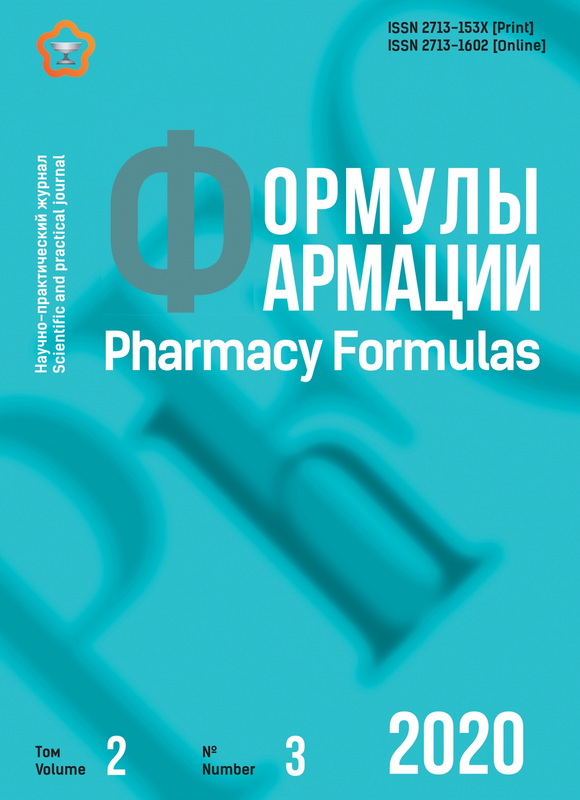Cariprazine is a modern antipsychotic with a favorable neuroendocrine profile
- 作者: Dorovskikh I.V.1, Pavlova T.A.1, Scheidegger J.M.2
-
隶属关系:
- 1586 Military Clinical Hospital, Podolsk, Podolsk, Russia
- Serbsky Federal Medical Research Centre for Psychiatry and Addiction, Moscow, Russia
- 期: 卷 2, 编号 3 (2020)
- 页面: 58-63
- 栏目: Biomedical Sciences
- URL: https://journals.eco-vector.com/PharmForm/article/view/46072
- DOI: https://doi.org/10.17816/phf46072
- ID: 46072
如何引用文章
全文:
详细
This article provides an overview of the causes and mechanisms of drug hyperprolactinemia (GP) associated with the use of antipsychotics, and describes its main clinical symptoms. The most probable factors of the high frequency of GP development that persists to date when using antipsychotics in the practice of a psychiatrist are considered. Modern methods of its prevention and correction developed by domestic and foreign researchers are presented. Emphasis is placed on the importance and necessity of careful collection of the patient's medical history, laboratory and instrumental examination, monitoring of the dynamics of hormonal indicators, correct choice of therapeutic tactics for the prevention of GP and its timely relief. The neuroendocrine profile of the latest generation of antipsychotics is considered. Special attention is paid to the partial agonist of D-2, D3-dopamine receptors – cariprazine. Based on the review of recent clinical studies, the possibilities of its use in clinical practice are considered in detail, and the neuroendocrine profile of the drug is presented. The prospects of its use as a corrector of GP associated with the treatment of mental disorders with other antipsychotics are evaluated.
作者简介
Igor Dorovskikh
1586 Military Clinical Hospital, Podolsk, Podolsk, Russia
编辑信件的主要联系方式.
Email: ig.dorovskikh@yandex.ru
Doctor of Medicine (MD), Professor, Head of the psychiatric Department
俄罗斯联邦, 142110, Московская обл., г. Подольск, ул. Маштакова, д. 4Tatyana Pavlova
1586 Military Clinical Hospital, Podolsk, Podolsk, Russia
Email: Pava-6@yandex.ru
SPIN 代码: 9060-4015
doctor-psychiatrist
俄罗斯联邦, 142110, Московская обл., г. Подольск, ул. Маштакова, д. 4Julia Scheidegger
Serbsky Federal Medical Research Centre for Psychiatry and Addiction, Moscow, Russia
Email: Scheidegger.julia@gmail.com
SPIN 代码: 3251-3805
junior researcher, Serbsky Federal Medical Research
俄罗斯联邦, 119991, Москва, Малый Кропоткинский пер., 23参考
- Lu ML, Shen WW, Chen CH. Time course of the changes in antipsychotic-induced hyperprolactinemia following the switch to aripiprazole. Prog. Neuropsychopharmacol. Biol. Psychiatry. 2008; 32 (8): 1978-81. doi: 10.1016/j.pnpbp.2008.09.016.
- Johnsen E, Jørgensen HA. Effectiveness of second generation antipsychotics: a systematic review of randomized trials. BMC Psychiatry. 2008;8: 31. doi: 10.1186/1471-244X-8-31.
- Wang ZM, Xiang YT, An FR, et al. Frequency of hyperprolactinemia and its associations with demographic and clinical characteristics and antipsychotic medications in psychiatric inpatients in China. Perspect. Psychiatr. Care. 2014; 50 (4): 257-63. doi: 10.1111/ppc.12050.
- Meaney AM, Smith S, Howes OD, et al. Effects of long-term prolactin-raising antipsychotic medication on bone mineral density in patients with schizophrenia. Br. J. Psychiatry. 2004; 184: 503-8. doi: 10.1192/bjp.184.6.503.
- Szarfman A, Tonning JM, Levine JG, et al. Atypical antipsychotics and pituitary tumors: a pharmacovigilance study. Pharmacotherapy. 2006; 26 (6): 748-58. doi: 10.1592/phco.26.6.748.
- Горобец, Л.Н. Нейроэндокринные дисфункции при использовании психофармакотерапии: клиника, диагностика, факторы риска и коррекция / Л.Н. Горобец, Г.Э. Мазо // Журнал неврологии и психиатрии им. С.С. Корсакова. – 2014. – Т. 114. – № 10. – C. 122-130.
- Montejoa AL, Arango C, Bernardo M, et al. Spanish consensus on the risks and detection of antipsychotic drug-related hyperprolactinaemia. Rev. Psiquiatr. Salud Ment. (Barc.). 2016; 9 (3): 158-73. DOI: 0.1016/j.rpsm.2015.11.003.
- Горобец, Л.Н. Медикаментозная коррекция нейролептической гиперпролактинемии / Л.Н. Горобец, Г.Э. Мазо // Обозрение психиатрии и медицинской психологии имени В.М.Бехтерева. – 2017. – № 2. – С. 79-85.
- Tewksbury A, Olander A. Management of antipsychotic-induced hyperprolactinemia. Ment. Health Clin. 2016; 6 (4): 185-90. doi: 10.9740/mhc.2016.07.185.
- Tuplin EW, Holahan MR. Aripiprazole, a drug that displays partial agonism and functional selectivity. Curr. Neuropharmacol. 2017; 15 (8): 1192-1207. doi: 10.2174/1570159X15666170413115754.
- Solmi M, Murru A, Pacchiarotti I, et al. Safety, tolerability, and risks associated with first- and second-generation antipsychotics: a state-of-the-art clinical review. Ther. Clin. Risk Manag. 2017; 13: 757-77. doi: 10.2147/TCRM.S117321.
- Kasper S, Lerman MN, McQuade RD, et al. Efficacy and safety of aripiprazole vs. haloperidol for long-term maintenance treatment following acute relapse of schizophrenia. Int. J. Neuropsychopharmacol. 2003; 6 (4): 325-37. doi: 10.1017/S1461145703003651.
- Potkin SG, Saha AR, Kujawa MJ, et al. Aripiprazole, an antipsychotic with a novel mechanism of action, and risperidone vs placebo in patients with schizophrenia and schizoaffective disorder. Arch. Gen. Psychiatry. 2003; 60 (7): 681-90. doi: 10.1001/archpsyc.60.7.681.
- Holt RI, Abdelrahman T, Hirsch M, et al. The prevalence of undiagnosed metabolic abnormalities in people with serious mental illness. J. Psychopharmacol. 2010; 24 (6): 867-73. doi: 10.1177/0269881109102788.
- Chen CK, Huang YS, Ree SC, et al. Differential add-on effects of aripiprazole in resolving hyperprolactinemia induced by risperidone in comparison to benzamide antipsychotics. Prog. Neuropsychopharmacol. Biol. Psychiatry. 2010; 34 (8): 1495-9. DOI: 0.1016/j.pnpbp.2010.08.012.
- Cutler AJ, Durgam S, Wang Y, et al. Evaluation of the long-term safety and tolerability of cariprazine in patients with schizophrenia: results from a 1-year open-label study. CNS Spectrums. 2018; 23 (1): 39-50. doi: 10.1017/S1092852917000220.
- Citrome L. Cariprazine in schizophrenia: clinical efficacy, tolerability, and place in therapy. Adv. Ther. 2013; 30 (2): 102-13. doi: 10.1007/s12325-013-0006-7.
- Durgam S, Greenberg WM, Li D, et al. Safety and tolerability of cariprazine in the long-term treatment of schizophrenia: results from a 48-week extension study. Psychopharmacology (Berl.). 2017; 234 (2): 199-209. doi: 10.1007/s00213-016-4450-3.
- Reagila (cariprazine): assessment report. European Medicines Agency, 2017. Available from: http://www.ema.europa.eu.
补充文件







